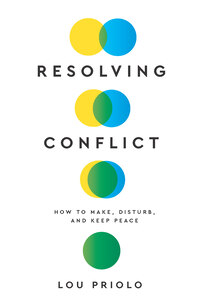The following is an excerpt taken from Resolving Conflict: How to Make, Disturb, and Keep Peace by Lou Priolo.
PREREQUISITE TWO: GENTLENESS
Walk in a manner worthy of the calling with which you have been called, with . . . gentleness. (Eph. 4:1–2)
THERE IS NO EXACT English translation for the Greek word for gentleness (or meekness). It is related to the character trait that we looked at in the first chapter—humility—because you cannot truly be meek without being humble.
A NECESSARY RESPONSIBILITY
From time to time, all Christians find themselves in a position where they will have to implement Galatians 6:1. “Brethren, even if anyone is caught in any trespass, you who are spiritual, restore such a one in a spirit of gentleness; each one looking to yourself, so that you too will not be tempted.” Granted, obeying this passage correctly might result in a conflict. But not following it properly (to the letter) will all but ensure one.
When someone we know who professes Christ has fallen into a pattern of sin from which he is not able to extricate himself, we are told to restore him—in a spirit of gentleness.
It is sometimes easier to illustrate something by its antithesis. So try to imagine how effective it would be to restore someone like this:
“What a boneheaded move that was! How could you do something so unbiblical? I never would have done such a thing! I’m really disappointed in you! You had better listen to me carefully because I really don’t want to have to rescue you again.” This is not the way to restore someone with meekness.
Gentleness does not present itself as “holier than thou” but rather communicates an awareness of its own shortcomings. “The things I’m telling you today, I had to tell myself just last week” is the attitude it conveys, or “I’m just one beggar showing another beggar where to find the bread.” I occasionally explain to my counselees, “Today, I’m giving you advice. Next week, you may be on this side of the desk giving me counsel because I’m every bit as much a sinner as you are (and maybe more of one).”
The second element in gentleness has to do with controlling one’s temper (restraining one’s anger). Anger is given lots of print in the Bible. It is mentioned, in one form or another, over 500 times in the Bible (far more than fear, which appears in various forms over 350 times).
Biblical counselors have to deal with the sin of anger more than almost any other sin. Apart from the sin of selfishness, sinful anger is probably the most prevalent sin in all of life.
In this chapter, we will look at seven perspectives or working definitions of gentleness—seven slices of the pie, if you please. These descriptions relate to the second element of meekness (controlling one’s temper).
1. Gentleness is the ability to distinguish between righteous anger and sinful anger.
2. Gentleness is refusing to allow any desire to become so deep-rooted that it produces anger (either in an attempt to obtain it or as a result of not being able to obtain it).
3. Gentleness is knowing how to harness righteous anger so that it may be used to destroy only those things that God would approve being destroyed.
***Much of the material in this section (and in section 5 later) has been adapted from chapter 2 of my book Keeping Your Cool: A Teen’s Survival Guide (Phillipsburg, NJ: P&R Publishing, 2014).
4. Gentleness involves knowing how to think during times of provocation.
5. Gentleness is knowing how to command not only your thoughts, but also your tongue, countenance, and body language during times of provocation.
6. Gentleness is remaining quiet when angry in order to ponder an appropriate response.
7. Gentleness is forgiving your offender quickly, thus not allowing yourself to meditate on and muse over the provocation.
Excerpt taken from Chapter Two of Resolving Conflict: How to Make, Disturb, and Keep Peace by Lou Priolo, copyright 2016, P&R Publishing.


Comments